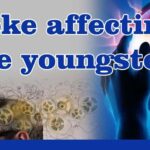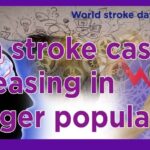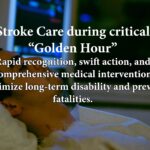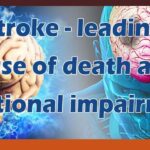Stroke disorder is a leading cause of serious long-term disability and mortality. Time is the key to survival in times of stroke. Stroke can often be a silent or painless disease that occurs suddenly. According to the Indian Stroke Association, the incidence of stroke in India has increased by almost 100 percent in the past few decades.
Stroke is a leading cause of serious long-term disability and mortality. According to the Indian Stroke Association, the incidence of stroke in India has increased by almost 100 percent in the past few decades. Around 1.8 million people in India suffer from stroke every year. Identifying the early signs and symptoms and getting treatment within the first four and a half hours (usually termed as the Golden Hour) after the onset is crucial. A delay in seeking the right treatment can lead to disability or death.
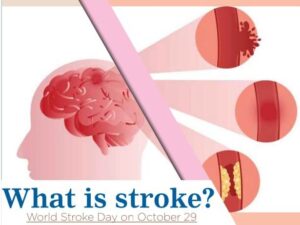

Stroke arises when there is a blockage or rupture of the blood vessels in the brain. Lack of oxygen and essential nutrients in the brain can lead to the death of brain cells that brings in serious problems. Since the brain controls each and every action, any disturbances can hamper the brain’s function. A brain stroke can happen anytime irrespective of age, gender and can affect the ability to move, speak, eat, cognitive abilities, and control over your own body.
Stroke is a state of Medical Emergency
Ischemic Stroke is the most common type, around 85 to 88 percent of strokes fall under this category which causes loss of oxygen to the brain due to a blockage of a vessel in the brain. Over time, high blood pressure can lead to the rupture of blood vessels in the brain. This is called a hemorrhagic stroke which is rare. It is important for patients to get proper medical evaluations done at the hospital to identify the types of stroke they are having.
Patients should receive immediate medical attention within one hour-the golden hour after they develop symptoms of stroke as the patients have a much greater chance of surviving and avoiding long-term brain damage if they arrive at the hospital and receive treatment with a clot-busting drug. In case the patient goes without treatment beyond the golden hours, it increases the risk of irreversible damage to the brain.
BE FAST, don’t delay.
Time is the key to survival in times of stroke. Stroke can often be a silent or painless disease that occurs suddenly. It is also termed a silent killer. If you think someone may be having a stroke use the F.A.S.T method to identify the early signs and symptoms. It stands for FAST (Facial drooping, Arm weakness, Speech difficulties and Time).
Identifying these signs and symptoms, reducing the risk factors, getting the best possible treatment available, and finding a hospital that is equipped to handle such critical conditions is vital.
Also Read: Brain Stroke Patients – Improve Quality of Life
Tips to follow
1. Seek help – Call for an ambulance if you find someone expiring the symptoms of stroke
2. Stay calm and look after the patient – One can also perform CPR before the arrival of the ambulance. Try getting information from the patient by talking to them and constantly monitoring their symptoms.
3. Don’t give any medicine or anything to eat – Avoid giving medicine such as aspirin, food or water to someone having a stroke. Stroke can cause paralysis which can make it difficult for the person to chew or swallow.


Dr. Srinivasa R
Lead Consultant – Neurology
Aster CMI Hospital



